Meet the Trainees
Filter by Year
Adalberto Ubinas
Ph.D. Student
Entered 2022
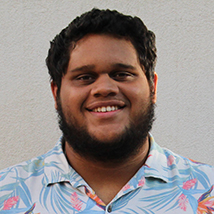 Department:
Biology
Department:
BiologyMentor: Kelly Miller, Ph.D.
Interests: Physiological Ecology
Bio
Adalberto Ubiñas Romero was born in Puerto Rico. At an early age, he developed an interest in STEM, specifically in the biological sciences. When Ubiñas became an open water diver, it sparked his curiosity about invertebrate communities and research.
After Ubiñas completed high school at Colegio La Merced, he attended the University of Puerto Rico, where he obtained a bachelor's degree in coastal marine biology. As an undergraduate, Adalberto worked with Dr. Steven Sloan and Dr. Ariel Diaz, studying the invertebrate and fungal communities associated with Plumeria alba in the Guánica dry forest in Puerto Rico. He also participated in several Research Experience for Undergraduate (REU) programs, including the Blandy Experimental Farm at the University of Virginia, the Summer Undergraduate Research Fellowship in Oceanography (SURFO) at the University of Rhode Island, and the Organization for Tropical Studies Research in Costa Rica.
Ubiñas's professional career started in Spain, where he obtained a pilot and remotely operated vehicle technician license; later, he worked with the EcoExploratorio Science Museum of Puerto Rico as a tour guide and educator. Currently, Ubiñas is studying climate change-related dynamics in pollinators at the Sevilleta Long-Term Ecological Research (LTER) program in New Mexico.
Aidan Dunne
M.S. Student
Entered 2024
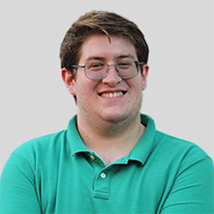 Department:
Earth and Planetary Sciences
Department:
Earth and Planetary SciencesMentor: Marisa Repasch, Ph.D.
Interests: Biology & Earth and Planetary Sciences
Bio
Aidan Dunne is a native of Albuquerque, New Mexico. From a young age, he frequently visited the New Mexico Museum of Natural History and Science and the ABQ BioPark Aquarium and Zoo with his grandmother, which sparked his love for biology and science. This early fascination grew into an interest in dinosaurs and prehistoric life, laying the foundation for his future academic and research pursuits.
After high school, Dunne attended The University of New Mexico (UNM). He initially planned to study medicine but switched to a double major in Biology and Earth and Planetary Sciences. His undergraduate research focused on vertebrate microfossil assemblages from the Chadronian in the White River Group out of Nebraska. This work culminated in a presentation at the Society of Vertebrate Paleontology (SVP) annual conference.
Dunne is pursuing his master's in Earth and Planetary Sciences at UNM in the Repasch Lab, focusing on geomorphology and carbon sequestration.
Looking ahead, Dunne plans to pursue a Ph.D. and to work in a museum setting or continue doing research with organizations such as the United States Geological Survey (USGS), the U.S. Department of the Interior Bureau of Land Management (BLM), or the Department of Energy's National Laboratories.
Alexandra Apagar
Ph.D. Student
Entered 2021
 Department:
Earth and Planetary Sciences
Department:
Earth and Planetary SciencesMentor: Jason Moore, Ph.D.
Interests: Sedimentology/Stratigraphy/Paleoclimate/Paleontology
Bio
Alexandra (Alex) Apgar's childhood was dedicated entirely to learning more about the world around her. She became particularly enamored by fossils after discovering several rugose corals in her backyard. She also developed an interest in geology after she uncovered multiple turquoise pebbles. Though these pebbles turned out to be from a previous owner's fish tank, her fascination with rocks and prehistoric creatures never faded. Apgar's interests have led her to pursue a Master's degree in the Department of Earth & Planetary Sciences.
Her current work with Professor Gary Weissmann and Associate Professor Jason Moore focuses on using modern analogue rivers to identify and classify the paleoecology of sedimentary basins within the Chinle (Late Triassic) and Nacimiento (Early Paleocene) formations. In addition, Apgar is interested in education and outreach, and she plans to work as a museum researcher and an educational director.
Amanda Dobrov
M.A. Student
Entered 2021
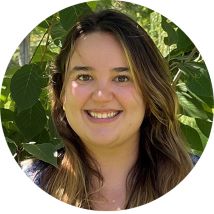 Department:
Anthropology
Department:
AnthropologyMentor: Kari Schleher, Ph.D.
Interests: Public Archaeology
Bio
Amanda Dobrov is a master's student in Public Archaeology. Her interest in archaeology started in High School when she got the chance to participate in Crow Canyon Archaeological Center's High School Field School. After that experience, she knew she had found her niche.
In partnership with the National Park Service, Dobrov's research involves working on museum collections of Mojave Desert ceramics curated at Joshua Tree National Park. It is centered around ceramic analysis and the utilization of petrography to investigate ceramic typologies.
Dobrov's career goals are to work as an archaeologist on public lands to help preserve, protect, and disseminate archaeological knowledge to the public. She has experience working for the National Park Service and is interested in working for any federal or state agency.
Andreanna Roros
M.S. Student
Entered 2022
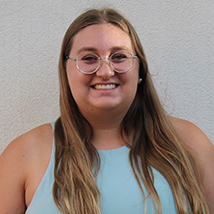 Department:
Earth & Planetary Sciences
Department:
Earth & Planetary SciencesMentor: Adrian Brearley, Ph.D. and Laura Crossey, Ph.D.
Interests: Geochemistry/Petrology/Mineralogy
Bio
Andreanna Roros primarily grew up in Severna Park, Maryland, but credits her geology interest with her experiences living in Idaho. She became interested in the natural landscape, preservation, and earth sciences after being exposed to many museums and National Parks, especially Yellowstone.
She attended the University of Delaware, where she researched how deicing practices have led to an increase in radium at Best Management Practices (BMPs) throughout Delaware, causing a rise in groundwater contamination. She also participated in four different field camp programs, one that included studying the geological landscape of New Mexico. In addition, Roros took many museum studies courses and worked at three campus museums, including the Mineralogical Museum, Mechanical Hall Gallery, and Old College Gallery. She also interned at the Center for Historic Architecture and Design (CHAD), where she researched threatened buildings in Delaware and created GIS-related maps. Roros graduated with a B.S. in Geological Sciences, a minor in Coastal and Marine Geoscience, and received a graduate certificate in Geographic Information Systems (GIS).
Roros' research has primarily focused on groundwater contamination and radiogenic isotopes. She had internships with the Delaware Geological Survey and received a research grant from USGS through the Water Resource Center at the University of Delaware. Currently, Roros is excited to work with Dr. Adrian Brearley to learn more about air contamination, mineralogy, and particulate matter at the Laguna Pueblo Superfund Site. In addition, she will be working alongside other UNM departments, such as the school of engineering, and health sciences, to better understand how Uranium has negatively impacted Native Americans' lives in proximity to the Jackpile Mine.
Ashley Willis Mascarenas
Ph.D. Student
Entered 2024
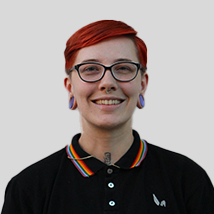 Department:
Biology
Department:
BiologyMentor: Thomas Turner, Ph.D.
Interests: Biology
Bio
Ashley Willis Mascareñas has been passionate about adventure, exploring the unknown, and getting muddy from a very young age. She soon realized that studying and pursuing a career in biology would be the perfect way to follow her passions.
Willis Mascareñas earned her undergraduate degree in Biology with a concentration in ecology, evolution, and organismal biology at The University of New Mexico (UNM). While at UNM, she worked in the Museum of Southwestern Biology in the Department of Fishes. She also served as a Water Resource Management fellow and worked with the American Southwest Ichthyological Researchers, a group dedicated to fish conservation.
Now a Ph.D. student at UNM, Willis Mascareñas is focused on using museum collections to study how freshwater fish respond to changes in their habitats and how these responses vary across time and space. Under the advisement of Tom Turner and the Turner Aquatic Conservation Lab, her research will center on the desert rivers of the Southwest and the fish species that inhabit them.
Blair Mirka
Ph.D. Student
Entered 2021
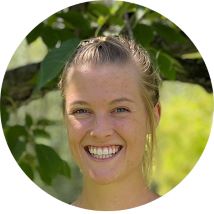 Department:
Geography & Environmental Studies
Department:
Geography & Environmental StudiesMentor: Christopher Lipptt, Ph.D.
Interests: Geography
Bio
Blair Mirka's research has included low altitude remote sensing from UAVs, Satellite image processing and photogrammetry, and Structure from Motion (SfM) modeling. Specifically, she has worked on detecting trash fires from satellite imagery and mapping deforestation plots in southern China's Fanjingshan National Nature Reserve.
During her master's program, Mirka was accepted as a Marshall Plan Foundation Scholar to conduct research in Austria. There she was able to test UAV-based thermal detection methods for arboreal primates, evaluate Repeat Station Imagery (RSI) applicability to wildlife monitoring, and test TIR imageries ability to create accurate 3D models using SfM photogrammetric techniques.
Mirka has also been an active member of the American Society for Photogrammetry and Remote Sensing (ASPRS) both at San Diego State University (SDSU) and at the University of New Mexico, where she is the current president of the student chapter.
Caitlyn Oliver Brown
Ph.D. Student
Entered 2024
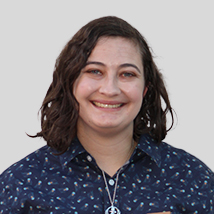 Department:
Biology
Department:
BiologyMentor: Michael Andersen, Ph.D.
Interests: Biology
Bio
Caitlyn Oliver Brown spent summers exploring the Sierra Nevada mountains and developed a love for nature when she was young. In high school, she volunteered at the Oakland Zoo as a teen docent, introducing her to science communication. After attending a Wildlife Conservation Network Expo, she developed an interest in research.
Oliver Brown graduated from San José State University (SJSU) with a B.S. in Biology, with a concentration in ecology and evolution. During her undergraduate career, Oliver Brown volunteered in the Biology Department's Bird and Mammal Museum, which sparked her interest in museum collections. She worked on an undergraduate research project using Clark's Nutcracker specimens, where she compared morphological measurements across populations. After graduating from SJSU, Oliver Brown worked three field seasons as a research technician. She worked on mule deer, Greater Sage-Grouse, and California Spotted Owls. While she enjoyed working in the field, Oliver Brown longed to return to museum work.
After a two-year break, Oliver Brown began a master's program at the University of Alaska Fairbanks (UAF). She worked with Dr. Kevin Winker, the curator of birds at the University of Alaska Museum of the North. Oliver Brown's thesis examined gene flow, divergence, and local adaptation in Beringian birds. While at UAF, she worked as a Curatorial Assistant, collecting and preparing bird specimens. After earning her M.S. in 2024, Oliver Brown started a Ph.D. at The University of New Mexico, studying biology under the advisement of Mike Andersen at the Museum of Southwestern Biology. She also still collaborates with her Master's advisor, Dr. Kevin Winker.
Cameron Chavez Reed
Ph.D. Student
Entered 2023
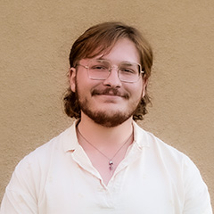 Department:
Earth and Planetary Sciences
Department:
Earth and Planetary SciencesMentor: Karl Karlstrom, Ph.D.
Interests: Tectonics/Structural Geology
Bio
After high school, Chavez Reed headed to Arizona State University (ASU), where they discovered a passion for geoscience. They graduated with a degree in Geoscience and Sustainability, simultaneously developing a keen interest in integrating environmental and land justice perspectives into geoscience education. This experience inspired Chavez Reed to engage in undergraduate research, eventually serving as the foundation for their Honors thesis on geoscience education and environmental justice.
Upon graduating from ASU, Chavez Reed advanced to the Master's program in Earth and Planetary Sciences at the University of New Mexico (UNM). Under the mentorship of Dr. Karl Karlstrom, they delved into specialized research, mainly focusing on differential incision in the San Juan system. Utilizing advanced geochronological and geodetic methods, they aim to elucidate the uplift and evolutionary history of the Southern Rockies.
Chavez Reed is pursuing a Ph.D. at UNM in the tectonics lab in the Department of Earth and Planetary Sciences. Under Dr. Karlstrom's guidance, their research spans tectonic geomorphology and geoscience education.
Ceara Purcell
Ph.D. Student
Entered 2021
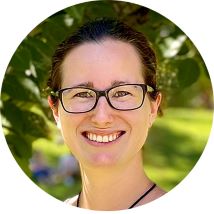 Department:
Earth and Planetary Sciences
Department:
Earth and Planetary SciencesMentor: Corinne Myers, Ph.D.
Interests: Sedimentology/Stratigraphy/Paleoclimate/Paleontology
Bio
Purcell published a paper on her master's research investigating changes to brachiopod niche occupation related to major abiotic and biotic shifts through the Late Ordovician. She is currently working with her mentor, Assistant Professor Corinne Myers, in the Department of Earth and Planetary Sciences on questions related to the paleoecology and paleogeography of the Cretaceous Western Interior Seaway.
Charlotte Robinson
Ph.D. Student
Entered 2023
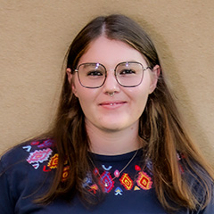 Department:
Anthropology
Department:
AnthropologyMentor: Frances Hayashida, Ph.D.
Interests: Archaeology
Bio
Furthering her academic journey, Robinson enrolled at the University of Central Florida (UCF), where she received her BA and MA in Anthropology. Driven by a focus on the archaeological subfield, she expanded her technical capability, earning certifications in Geographic Information Systems (GIS) and Native American Studies. Her GIS experience enabled her to complete an undergraduate and a graduate thesis centering on hydrological earthworks in the Bolivian Amazon. While at UCF, Robinson engaged in local archaeological endeavors in Cape Canaveral and the Ocala National Forest and international pursuits in Turkey and Bolivia.
Currently enrolled in the Museum Research Traineeship program at the University of New Mexico, Robinson is working on developing her dissertation project.
Chris McDaniels
Ph.D. Student
Entered 2021
Department: BiologyMentor: Lisa Barrow, Ph.D.
Interests: Evolutionary Biology
Bio
McDaniels is broadly interested in herpetology (the study of reptiles and amphibians). Specific areas of interest include phylogeography and diversification, particularly with understudied, geographically variable taxa.
Danielle Land
M.S. Student
Entered 2022
 Department:
Biology
Department:
BiologyMentor: Joseph Cook, Ph.D.
Interests: Conservation Biology
Bio
Danielle Land is from Albuquerque, New Mexico. Her love for the natural world began as a child by visiting the New Mexico Museum of Natural History and Science (NMMNHS) and spending time outdoors. Her desire to learn more about science lead her to obtain a B.S. degree in Biology with minors in chemistry and philosophy at the University of New Mexico (UNM). Following graduation, Land volunteered in the Division of Mammals at the UNM Museum of Southwestern Biology. Then, wanting to continue in the field of biology, she worked as a post-baccalaureate student (NSF REPS) in Dr. Joe Cook’s lab to acquire laboratory and field experience. There she examined the evolutionary history of Eurasian shrews in the Sorex caecutiens group in collaboration with Dr. Jason Malaney at NMMNHS.
While working on her master’s degree, Land will continue to work with the Cook Lab and the Museum of Southwestern Biology to take a more detailed look into Eurasian shrew phylogenetics using museum-loaned tissue samples. Through the MRT program, Land hopes to gain a more interdisciplinary understanding of museum infrastructure and continue to be an advocate for building and preserving collections.
David Giovannetti-Nazario
Ph.D. Student
Entered 2022
 Department:
Earth & Planetary Sciences
Department:
Earth & Planetary SciencesMentor: Tyler Mackey, Ph.D.
Interests: Sedimentology/Stratigraphy/Paleoclimate/Paleontology
Bio
David Giovannetti-Nazario was born and raised in Puerto Rico. Ever since he was a child, he was always fascinated by books, comics, films, and TV and the stories they told. Later he realized that studying science is essentially asking big questions to tell a compelling story that would help us understand our world.
Giovannetti-Nazario attended the University of Puerto Rico at Mayagüez and majored in English (linguistics). Having taken an introductory geology course as an elective, he immediately fell in love with geosciences and chose it as a second major. In his final year as an undergraduate, Giovannetti studied massive magnetite deposits in an iron skarn as part of a research project. In continuation with his undergraduate project, he began his graduate studies in 2020 focusing on garnet chemistry and studying skarn formation processes.
Giovannetti's interests lie in various geology subfields focusing mainly on using the geochemistry and geochronology of mineral and rock samples to understand how geologic systems and deposits form and evolve throughout time.
Giovannetti-Nazario's research will use petrography, geochemistry, and geochronology to understand paleolake deposits in Antarctica. Additionally, outcrop-scale observations will help identify these deposits' diagnostic features, aiding the Mars rover missions in identifying similar deposits on the Red Planet.
David Lawrence
Ph.D. Student
Entered 2023
 Department:
Geography
Department:
GeographyMentor: Maria Lane, Ph.D.
Interests: Cultural/Human Geography
Bio
Beginning his academic journey at Los Angeles Pierce College, Lawrence earned an Associate of Arts in Geography and STEM Studies. He then transferred to California State University, Northridge (CSUN), where he majored in Geography. During his time at CSUN, he chose to specialize in historical geography, a decision that shaped his undergraduate thesis—a comprehensive study examining the historical geography of Antelope Valley.
After acquiring his Bachelor of Arts, Lawrence continued his educational pursuit in CSUN's graduate geography program. He refined his research focus to highlight the historical geography of science and museum studies. Lawrence completed a master's thesis that scrutinized the evolution of dinosaur exhibits over time and space. Lawrence synthesized archival documents with fossil specimens to support his findings, offering a multi-dimensional look at the subject.
Lawrence is directing his research towards the historical geography of the dinosaurian origin of birds, seeking to understand how this particular theory has geographically evolved.
Destiny Gonzalez
M.S. Student
Entered 2023
 Department:
Museum Studies
Department:
Museum StudiesMentor: Joe Cook, Ph.D.
Interests: Biology
Bio
Destiny Gonzalez was Born and raised in Albuquerque, New Mexico. Frey-Gonzalez discovered her passion for science during a transformative high school field trip to the Valles Caldera. Inspired by this experience, she volunteered for the Bosque Ecosystem Monitoring Project, leading peers in water sample collection and data analysis. In her senior year, Frey-Gonzalez devoted over 200 hours to a service project at the Museum of Southwestern Biology's Division of Mammals.
Gonzalez attended Lewis & Clark (L&C) College in Portland, Oregon, as a first-generation college student, earning a bachelor's degree in environmental studies. At L&C, she took on the role of President of the Natural History Club, overseeing mammal specimens and their accompanying data. Gonzalez further expanded her curatorial skills as a Curatorial Assistant on campus, orchestrating exhibits in the college library's atrium. Additionally, she worked as a Laboratory Preparator for Dr. Greta Binford's Invertebrate Zoology course, managing teaching collections and guiding students in curation projects.
After earning her Bachelor's in Environmental Studies, Gonzales opted for a gap year to explore her personal interests. During this time, she worked in the hospitality sector, taking on various roles, such as hostess and bartender at several restaurants around the Portland area.
Currently mentored by Dr. Joe Cook, Gonzalez is gaining invaluable field and laboratory experience in his Lab. Her master's focus spans museum education, management, and pathogen research. She aims to bridge the gap between public-facing and research-based science museums and centers, particularly in her hometown.
Erin Berkowitz
M.S. Student
Entered 2022
 Department:
Museum Studies
Department:
Museum StudiesMentor: Hannah Marx, Ph.D. and Loa Traxler, Ph.D.
Interests: Biology
Bio
Erin Berkowitz grew up in Cleveland, Ohio. Her family regularly visited the Cleveland Metroparks, which sparked her interest in the natural world. Berkowitz attended Ursuline College, a private liberal arts school where she took ecology and genetics courses that inspired her interest in the natural sciences. She graduated with a bachelor’s in biology and life sciences. Because Museums were a substantial part of her upbringing, Berkowits decided to volunteer at the Cleveland Museum of Natural History and then with the Division of Natural Resources at the Cleveland Metroparks, where she would complete two field seasons working on the Plant Community Assessment Program (PCAP).
As an intern at the Conservation and Land Management, Berkowitz worked on the Seeds of Success (SOS) program, where she became familiarized with the flora of the Great Basin region and gained field experience in proper plant collection. In addition, she was a curatorial intern at Mt. Cuba Center in Delaware. As a herbarium workroom manager/curatorial assistant at the herbarium at California Botanic Garden, she gained experience with specimen processing, mounting, digitizing, and filing.
Berkowitz has presented at two conferences for the Society for the Preservation of Natural History Collections (SPNHC) on various topics related to her work at CalBG (2019 & 2022). She is a member of SPNHC and Southern California Botanists (SCB) and is the professional development officer for the Early Career Section of the Society of Herbarium Curators.
Currently, Berkowitz is developing a thesis project incorporating data from historical plant specimens and recent collections to answer scientific questions under the mentorship of Herbarium curator Dr. Hannah Marx and senior collections manager Harpo Faust from the UNM Museum of Southwestern Biology.
Esteban Rosario Sánchez
Ph.D. Student
Entered 2023
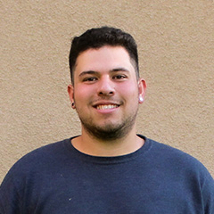 Department:
Biology
Department:
BiologyMentor: Lisa Barrow, Ph.D.
Interests: Vertebrate Biology
Bio
Esteban Rosario Sánchez was born and raised in Puerto Rico. His experience with the lush landscapes of Puerto Rico nurtured his curiosity about the natural world. After attending a STEM-focused public high school in Puerto Rico, he continued his education at the University of Puerto Rico at Humacao. There, he earned a dual degree in Biology, specializing in Microbiology and Wildlife Management.
During his time in Humacao, Rosario Sánchez had the opportunity to contribute to significant research projects. He worked in Dr. Denny Fernandez's Ecology and Quantitative Analysis lab, focusing on tree diversity and ecology. Additionally, he collaborated with Dr. Ariel Diaz in his entomology lab.
In the summer of 2022, Rosario Sánchez deepened his research experience through Research Experience for Undergraduates (REU) at the Blandy Experimental Farm, affiliated with the University of Virginia. Under the guidance of Dr. Allyson Degrassi and Dr. Patrick Crumrine, he conducted pivotal research on freshwater turtles.
These experiences inspired Rosario Sánchez to pursue graduate studies at the University of New Mexico. Currently, he is collaborating with Dr. Lisa Barrow in her Amphibian and Reptile Biodiversity Lab—his graduate research centers on the impact of climate change on freshwater turtles in their natural ecosystems.
Irvin Arroyo-Torres
Ph.D. Student
Entered 2023
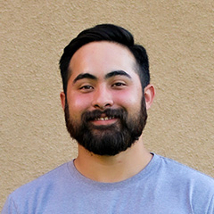 Department:
Biology
Department:
BiologyMentor: Thomas Turner, Ph.D.
Interests: Biology with a concentration in Ecology, Evolution, and Organismal Biology
Bio
Arroyo-Torres graduated from College & Career High School while securing an Associate of Applied Science in Integrated Studies from Central New Mexico Community College, thanks to dual-credit courses. Upon entering the University of New Mexico (UNM), Arroyo-Torres was somewhat uncertain about his career path but knew it would be rooted in Biology. A formative course in General Vertebrate Zoology with Dr. Steven Poe crystallized his resolve to delve into the staggering diversity of life. This passion led to his first research experience, assisting in studies on anole lizards under Dr. Poe.
During his undergraduate years at UNM, Arroyo-Torres actively participated in the Poe Lab and the Amphibian & Reptile Biodiversity Lab. He was involved in diverse research initiatives ranging from anole lizard behavior to amphibian genetic diversity. As a capstone to his studies, he spearheaded a research project focused on Western Diamond-Backed Rattlesnakes, utilizing resources from the Museum of Southwestern Biology at UNM under the guidance of Dr. Lisa Barrow.
After earning his Bachelor's in Biology, Arroyo-Torres is embarking on graduate research studying the impact of invasive fish species on the parasite communities within garter snakes under the mentorship of Professor Thomas Turner.
Joseph Kleinkopf
Ph.D. Student
Entered 2021
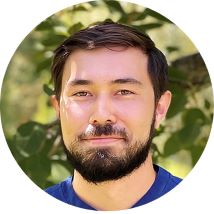 Department:
Biology
Department:
BiologyMentor: Hannah Marx, Ph.D.
Interests: Systematics/Phylogenetics
Bio
While at the University of Colorado Boulder, Kleinkopf worked on a project in Southeastern Colorado/Northeastern New Mexico, where he used genetic data to test for signals of divergence within species of flowers of which morphologically aberrant populations exist. At Washington State University (WSU), Kleinkopf's master's thesis focused on using genomic data to disentangle relationships among species in the genus Cyrtandra (Gesneriaceae) on the Hawaiian Islands.
Kleinkopf hopes to continue working with phylogenomic tools at the University of New Mexico to better understand the evolution and assembly of alpine plant communities of the Southern Rocky Mountains and the Sky Islands of the Southwest.
Josiah Lavender
Ph.D. Student
Entered 2024
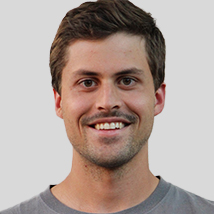 Department:
Biology
Department:
BiologyMentor: Christopher Witt, Ph.D.
Interests: Evolutionary Biology
Bio
Josiah Lavender grew up in Athens, Georgia, where his fascination with nature began early in life. At just six years old, inspired by his older brother, he started feeding and identifying birds in his parents' backyard. This childhood interest grew through middle and high school years, evolving into a deep interest in ornithology and ecology. In his junior year of high school, he attended a birding camp on Hog Island, Maine, where he was introduced to museum curation and learned how to prepare a Swainson's Thrush. This experience marked his first step into the world of biological museums.
As an undergraduate at the University of Georgia (UGA), Lavender collaborated with Dr. Clark Rushing, an avian ecologist specializing in the annual cycles of North American breeding birds. Under Dr. Rushing's guidance and with support from the Smithsonian Migratory Bird Center, Lavender focused on the breeding ecology of Painted Buntings. Using statistical models and analyzing point-survey and location data he gathered on Little St. Simons Island, Lavender explored how unique habitats, like maritime grasslands, affect the population density of this declining songbird. This research allowed him to merge his passion for bird ecology with his interest in computational approaches to studying natural processes. Lavender completed his studies at UGA with a B.S. in Ecology and a minor in mathematics.
As a Ph.D. student, Lavender's research interests focus on understanding the impacts of climate change on migratory birds, emphasizing the role of evolutionary adaptation in helping birds cope with warming temperatures. This research will analyze genetic samples housed in the Museum of Southwestern Biology (MSB) at the University of New Mexico (UNM) and potentially morphological data from specimens in the MSB.
Lavender hopes to collaborate with members of the Andersen Lab at UNM, whose work emphasizes biographical patterns of species divergence and who have extensive experience working with museum specimens. Lavender also hopes to collaborate with Helen Wearing, who works in the Department of Biology and Mathematics & Statistics, whose research emphasizes using computational methods to answer questions in biology and ecology.
Kaitlyn "Katie" Goss
Ph.D. Student
Entered 2023
 Department:
Earth and Planetary Sciences
Department:
Earth and Planetary SciencesMentor: Adrian Brearley, Ph.D.
Interests: Petrology and minerology of meteorites
Bio
In her junior year, Goss was selected for a Research Experience for Undergraduates (REU) program at the American Museum of Natural History in New York. Under the guidance of Dr. Michael Weisberg, she studied an Enstatite Chondrite and presented her research at the 2022 Lunar and Planetary Science Conference, winning the Dwornik Award. Her work was later published in March 2023.
During the summer before her senior year, Goss was part of another REU program at Brown University, where she collaborated with Dr. Stephen Parman and Dr. Joseph Boesenberg to study a Carbonaceous Chondrite. Fascinated by Chondrites—ancient rocks that offer a glimpse into the early solar system—she opted to specialize in this field for her graduate studies.
Goss is a first-year Ph.D. student at the University of New Mexico. She is eager to continue researching Carbonaceous Chondrites and is excited to work with her mentor, Dr. Adrian Brearley.
Kathleen Webster
M.S. Student
Entered 2021
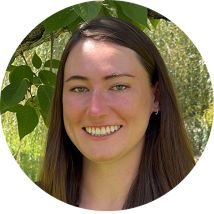 Department:
Biology
Department:
BiologyMentor: Lisa Barrow, Ph.D.
Interests: Evolutionary Biology
Bio
Through her master's research, Webster became fascinated by the unique herpetofauna of the Comoros Archipelago and has since been involved in continued research on the islands, including a description of a new snake species and re-assessments for the IUCN Red List status of Comoros native species. Kathleen continues studying the reptiles and amphibians of the Comoros Archipelago during her dissertation research at the University of New Mexico, focusing on conservation, invasion biology, and population genomics and working in close collaboration with the Museum of Southwestern Biology.
Kimimila Atcitty
M.S. Student
Entered 2021
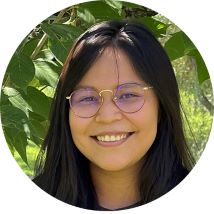 Department:
Biology
Department:
BiologyMentor: Blair Wolf, Ph.D.
Interests: Conservation Biology
Bio
Kyana Montoya
M.S. Student
Entered 2021
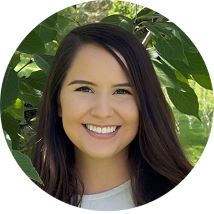 Department:
Biology
Department:
BiologyMentor: Christopher Witt, Ph.D.
Interests: Evolutionary Biology
Bio
Montoya is interested in studying mitonuclear coevolution and its role in species distributions. She intends to use Audubon's Warblers as her study organisms. She received a National Science Foundation (NSF) Graduate Research Fellowship to pursue her interests working in the Witt Lab and the Museum of Southwestern Biology.
Larkin Chapman
Ph.D. Student
Entered 2021
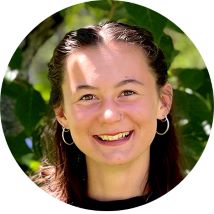 Department:
Anthropology
Department:
AnthropologyMentor: Emily Jones, Ph.D.
Interests: Archaeology
Bio
Chapman's research interests include utilizing stable isotopes, aDNA analysis, and radiocarbon dating to investigate the peopling of the Americas at the end of the Pleistocene and the faunal extinctions that coincided with this event. She is honored to have been selected to participate in UNM's Museum Research Traineeship program. She will complete her research utilizing invaluable museum collections to study the extinction of prehistoric horses in North America at the end of the last ice age.
In spring 2022, Larkin will present at the Society for American Anthropologist's Annual Meeting with two collaborators from Iowa State on the percentage of maize found in the paleodiet of prehistoric domestic dogs in Iowa. Larkin is also completing her 6th year of National Collegiate Athletic Association (NCAA) eligibility and will compete in cross country, and track meets for the Lobos during the 2021-2022 school year.
Laurel Martinez
M.S. Student
Entered 2023
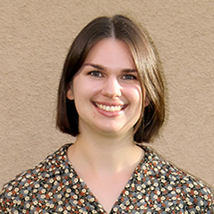 Department:
Biology
Department:
BiologyMentor: Thomas Turner, Ph.D.
Interests: Ecological Restoration
Bio
Martinez completed her high school education at Walter Johnson High School. She pursued her undergraduate degree at the University of Vermont (UVM), where she studied at the Rubenstein School of Environment and Natural Resources, majoring in Environmental Science and minoring in Plant Biology. At UVM, Martinez was a part of the Aiken Scholar's program. During the summer of 2015, she participated in a Research Experience for Undergraduates (REU) program at the Smithsonian Environmental Research Center's Marine Ecology Lab, where she researched oyster growth and feeding. In the spring of her junior year, she studied abroad for a semester in Botswana with Round River Conservation Studies, where she completed a project on elephant demography and their use of riparian resources.
Martinez's research is guided by her mentor, Dr. Thomas Turner. She collaborates with U.S. Forest Service Rocky Mountain Research Station professionals, including Katelyn Driscoll, Jacqueline Ott, Alexander Krichels, and the Museum of Southwestern Biology at the University of New Mexico.
Lexi Baca
Ph.D. Student
Entered 2023
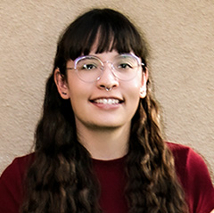 Department:
Biology
Department:
BiologyMentor: Joe Cook, Ph.D.
Interests: Genetics
Bio
After high school, Baca attended the University of New Mexico and earned her Bachelor of Science in Biology. As her undergraduate journey neared, uncertainty about her future career lingered. That's when she encountered a Mammalogy course taught by Dr. Joseph Cook, a distinguished professor at UNM and the curator of mammals at the Museum of Southwestern Biology (MSB). This course piqued her interest in museum work, and she started volunteering at the MSB, acquiring skills related to museum curation.
Post-graduation, Baca secured a research position in Dr. Cook's lab, focusing on the mitonuclear discordance of five-toed jerboas. Funded by the National Science Foundation, the project also involved collaboration with Dr. Jason Malaney at the New Mexico Museum of Natural History and Science. This opportunity led Baca to a fieldwork opportunity in Mongolia, contributing to a multi-institutional project called STEPP-NET. Currently working on her Ph.D., Baca continues to delve into the evolutionary intricacies of her study of species and other related projects, including DNA barcoding of diverse species, describing a new type of Ctenomys, and offering research guidance to students at various academic levels.
Lisa Garcia
M.S. Student
Entered 2022
 Department:
Biology
Department:
BiologyMentor: Felisa Smith, Ph.D. and Scott Collins, Ph.D.
Interests: Conservation Biology
Bio
Lisa Garcia was born and raised in Albuquerque, New Mexico. She has many fond memories of exploring her grandparents’ land in Carnuel and Chilili and taking care of the animals on their ranch. Nature was her playground, and she developed a passion for the land, plants, and animals.
Fresh out of high school, Garcia didn’t know about the opportunities in science. She is a first-generation college student; her mom suggested business because she was in that industry. So, Garcia earned a bachelor’s in business administration from the University of New Mexico (UNM) and pursued a career in marketing. She returned to UNM to pursue a second degree in biology because of her strong passion for nature. After watching Vice, a show about global catastrophes worldwide, she became interested in the effects of climate change.
Garcia was interested in paleoecology and extant plant interactions with water. She volunteered in Dr. FeGarcia Smith’s paleoecology lab at UNM to understand how organisms reacted to past climate change and to better predict how organisms may respond to future climate change. Garcia also completed a Research Experiences for Undergraduates (REU) at UC Berkeley with Benjamin Blonder, where she developed an investigation on how different leaf venation systems reacted to herbivory and drought. She presented a poster about this investigation at the 2022 ESA conference in Montreal. Currently, Garcia is exploring areas to pursue in her graduate program.
Louisa “Lou” Lara
Ph.D. Student
Entered 2022
 Department:
Anthropology
Department:
AnthropologyMentor: Loa Traxler, Ph.D.
Interests: Archaeology
Bio
Louisa "Lou" Lara was born and raised in the Chicagoland area and grew up in a Mexican- American immigrant household. She is passionate about her Mexican heritage, culture, museums, and anthropology.
Lara attended Indiana State University and majored in anthropology and history. During her undergraduate studies, she gained a new perspective and appreciation of museum studies and collections. She began working with Dr. Alex Badillo's photogrammetry laboratory, working on various projects, including 3D modeling and reconstruction of local tombstones in Indiana, prehistoric pottery at the Indianapolis Children's Museum, biological specimens at the Indiana State University biology laboratory, and aiding in the painting of a Zapotec digital replica of Monte Alban, Oaxaca. Lara also attended field school at the Center of American Anthropology under the direction of Dr. Jason King and learned valuable field and lab work lessons. In addition, Lara became very interested in museum curatorial and public work while working at the Terre Haute Children's Museum in Terre Haute, Indiana, and the Kohl Children's Museum in Glenview, Illinois.
Lara is currently completing the master's portion of her PhD coursework under the advisement of Dr. Loa Traxler. Her research will focus on Mesoamerican archaeology within Maya cultural aesthetics and color theory.
Marisol Meyer–Driovínto
Ph.D. Student
Entered 2024
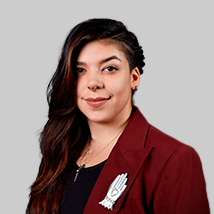 Department:
Geography
Department:
GeographyMentor: Yolanda Lin, Ph.D.
Bio
Born and raised in northern New Mexico with family roots in Albuquerque, Marisol Meyer-Driovínto feels grounded in the New Mexican landscape and works to serve its diverse communities. She is an artist by nature and a community and regional planner by practice, deeply appreciating and respecting the natural world.
Meyer-Driovínto earned her bachelor's degree in architecture and design from The University of New Mexico (UNM). After graduation, she spent time in Alicante, Spain, where she discovered her passion for community and regional planning and transdisciplinary research. She is completing her master's in community and regional planning at UNM and beginning her Ph.D. in Geography and Environmental Studies.
Meyer-Driovínto is a research graduate assistant for the Intermountain West Transformation Network, working closely with Yolanda C. Lin and other network members. She is also a founding organizer of Shared.Futures is an initiative that brings local artists and scientists together to envision research-based possible futures through an annual workshop at the Explora Children's Science Museum. In 2023, she was an invited speaker and panelist at the American Geophysical Union meeting to present on the Shared.Futures program and has been invited back as an early career co-convener for the "Science and Society: Art and Science" session at the 2024 meeting.
Her master's research in Community and Regional Planning examines the Santa Fe River Watershed government stakeholders, focusing on innovative methods to expand qualitative analysis with systems thinking approaches to improve planning solutions. At UNM, Meyer-Driovínto's research collaborations include working with Yolanda C. Lin in Geography and Environmental Studies and Renia Ehrenfeucht in Community and Regional Planning.
Mason Bright
M.A. Student
Entered 2024
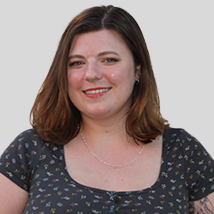 Department:
Museum Studies
Department:
Museum StudiesMentor: Carla Sinopoli, Ph.D.
Interests: History
Bio
Mason Bright is a first-year master's student in The University of New Mexico Museum Studies Department. Her research interests include pre-Industrial Revolution food systems, Indigenous methodologies for museum collection stewardship, and the role material culture plays in the construction of national identity.
Growing up, Bright wished she could go on a field trip every day. The unique ecology and history of her home state of Michigan provided ample opportunities for her to learn about both the natural and human worlds.
Bright attended Kalamazoo Valley Community College, earning an Associate of Arts in Liberal Arts, specializing in sociology and international relations. Mason then transferred to the University of Michigan (U-M) in Ann Arbor, MI, where she majored in History with minors in Museum Studies and Creative Writing. While at U-M, Mason conducted archival collection research with the University of Michigan Museum of Paleontology and served as a collections intern at the University of Michigan Museum of Anthropological Archaeology. Through her coursework, Bright became interested in the relationship between colonialism and museums as institutions and how to incorporate restorative practices within museum work. Bright graduated from U-M in 2024, receiving the Walter S. Tappan Award for Excellence in Museum Studies.
As an aspiring museum collections manager, Bright plans to work with historic cultural collections, specializing in coordinating repatriations and community building with historically colonized groups. At the University of Michigan, she was a peer facilitator with the Undergraduate Research Opportunity Program, which introduced her to interdisciplinary science communication. Bright looks forward to learning more about incorporating science communication with her work in museums.
Bright is enrolled in courses for her Master of Arts in Museum Studies at UNM. Her coursework centers around collections management and interdisciplinary research using museum collections.
Michael Fragua
M.S. Student
Entered 2024
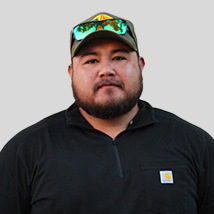 Department:
Biology
Department:
BiologyMentor: Joe Cook, Ph.D.
Interests: Conservation Biology
Bio
Michael Fragua was born and raised in Albuquerque, New Mexico. Throughout his life, he was surrounded by the outdoors through hunting and fishing, and he developed a deep commitment to land stewardship as one of his core values.
After graduating from High School, Fragua enlisted in the U.S. Army. He served as an Infantryman with the 101st Airborne Division for one term, advancing from sergeant to squad leader. Following his military service, Fragua returned to Albuquerque and pursued a B.S. in Biology at The University of New Mexico (UNM), concentrating on subjects that fueled his passion for biology, including ecology, evolution, and conservation.
During his undergraduate studies, Fragua worked with the U.S. Fish and Wildlife Service (USFWS) at Valle de Oro National Wildlife Refuge as a conservation (VDO NWR) and restoration crew member through the Ancestral Lands Conservation Corps (ALCC) program. He later continued his work at VDO NWR as a biology technician intern and obtained a biology internship through the USFWS and ALCC at VDO NWR.
Fragua is a first-year master's student in the Biology Department at UNM, focusing on conservation genetics and the phylogeography of small mammals in New Mexico. Under the guidance of Joseph Cook, he conducts research in the Mammals Division of the Museum of Southwestern Biology. His research centers on the dynamics of brown and green energy food webs among small mammals and their interactions across different trophic levels within the sky islands near New Mexico.
Nikolitsa "Litsa" Wooten
M.S. Student
Entered 2022
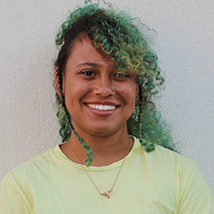 Department:
Museum Studies
Department:
Museum StudiesMentor: Joseph Cook, Ph.D. and Loa Traxler, Ph.D.
Interests: Biology
Bio
Litsa Wooten’s mother is Greek and joined the US Army, where she met Litsa’s father. Her family lived in Germany, Qatar, England, and Greece. Litsa attended Pinewood International American School in Thessaloniki, Greece.
Litsa started her undergraduate studies at Kansas State University (KSU) with a major in Animal Science and Industries (ASI) and a focus on Pre-Vet. She later changed her major to Fisheries, Wildlife, and Conservation Biology with a minor in ASI. During her sophomore year, Litsa began working in a mammal research lab at KSU. As an undergraduate, she assisted master’s students with their research on the phylogeography of mammals of the Great Plains and went on mammal collection field trips to Manitoba, South Dakota, Texas, and Minnesota. Her work in this lab piqued her interest in managing museum mammal collections.
After graduating, Litsa took a gap year and worked at the Comparative Medicine Group at KSU Vet-Med. There she learned how to care for various laboratory animals used for medical research. Then she started working at the Veterinary Diagnostic Laboratory at KSU Vet-Med to gain experience with Laboratory Information Management Systems (LIMS) and learn how to accession things into a database in preparation for her Museum Studies degree.
Litsa is working in the mammal collection under the advisement of Dr. Joe Cook with the UNM Museum of Southwestern Biology (MSB), investigating pathogens in mammals.
Niles Woods
Ph.D. Student
Entered 2024
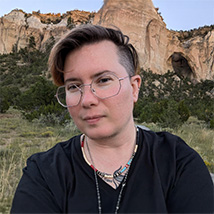 Department:
Anthropology
Department:
AnthropologyMentor: Hannah Mattson, Ph.D.
Interests: Archaeology
Bio
Niles Woods was assigned the wrong gender at birth, and he spent much of his early life feeling confused about his role in his family and society. At age ten, his father began taking him to the Denver Natural History Museum, where he developed an interest in and appreciation for science and museums. Human evolution and cultures have also been particularly interesting to him.
Woods pursued an associate's degree in sociology and completed a Bachelor of Arts in Anthropology. Although the focus of the degree was cultural anthropology, half of the classes were in biology and evolutionary anthropology. Two years later, after feeling he hadn’t found the answers he was seeking, Woods began pursuing a degree in counseling psychology. Upon completing his degree, Woods realized he was a Transgender man. This marked the beginning of his transition.
For the first five years of his counseling career, he found deep engagement and pride in his work, particularly in the field of trauma, where he often worked with transgender clients like himself. His combined degrees in anthropology and psychology helped him answer many of his childhood questions, yet new questions continued to emerge. By his seventh year, Woods recognized the early signs of provider burnout. Woods shifted his career path to address this and began a Ph.D. in Counselor Education and Supervision. However, upon starting the program, his advisor noted that his proposed dissertation topic seemed more aligned with archaeology than psychology.
After a lengthy discussion with his advisor, it became clear that despite his success in the program, he was not satisfied with the psychology focus, and a career change was necessary. Woods then applied and was accepted into the archaeology Ph.D. program at The University of New Mexico Department of Anthropology.
His advisors are Kari Schleher and Hannah Mattson. Woods will work with the material culture of the Ancestral Puebloan peoples of the Southwest at the Maxwell Museum, focusing on the archaeology of gender diversity and non-Western genders. His research will examine gender diversity in the archaeological record, utilizing material culture from the Maxwell Museum of Anthropology.
Patrick Baca
M.S. Student
Entered 2024
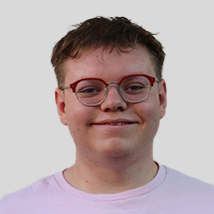 Department:
Biology
Department:
BiologyMentor: Thomas Thomas, Ph.D.
Interests: Evolutionary Biology
Bio
Patrick Baca is descended from a Nuevo Mexicano family that has lived in New Mexico for many generations. He grew up in Central New Mexico, surrounded by the natural world, which sparked his curiosity and led him to ask questions about the living world. After moving to Albuquerque, Baca pursued his personal and academic interests in biology.
Baca attended Central New Mexico Community College (CNM), earning associate's degrees in biology, sociology, and criminology alongside his high school diploma. In high school, Patrick began an internship at ¡Explora! The Science Center and Children's Museum of Albuquerque, where he used interactive science exhibits to teach science to patrons of all ages. During his last semester of high school, Patrick attended New Mexico Tech and studied biochemistry.
After high school, Baca enrolled at The University of New Mexico (UNM), where he studied evolutionary anthropology with a concentration on human biology and earned a B.S. He began a post-baccalaureate research project under the direction of Dr. Siobhán Mattison. In the summer of 2024, this project took Baca to the small island county of Vanuatu, where he conducted fieldwork on human health, economic development, and mortuary ecology on the Island of Tanna.
Baca is a first-year master's student in evolutionary biology, advised by Thomas Turner. His research is focused on evolutionary genomics and population genetics of freshwater fishes in the American Southwest, and he plans to utilize the immense collections of the Museum of Southwestern Biology at UNM to research these topics.
Quinlyn Baine
Ph.D. Student
Entered 2023
 Department:
Biology
Department:
BiologyMentor: Ellen Martinson, Ph.D.
Interests: Terrestrial Ecology
Bio
After earning her Bachelor of Science in Ecology from The Evergreen State College and completing a significant senior thesis on mercury bioaccumulation in algae and invertebrates, Baine transitioned into a research role. She spent four years as a research technician with the Washington State Department of Agriculture Entomology Lab, honing her insect collecting and identification skills. During this time, Baine tackled diverse projects, from studying grain pests to investigating invasive hornets. She also expanded her expertise abroad as a butterfly technician for the Alliance for a Sustainable Amazon in Peru.
Currently, Baine works closely with her mentor, Dr. Ellen Martinson, focusing on the co-evolution of gall-inducing insects, their host plants, and specialized predators. Collaborating with multiple divisions at the Museum of Southwestern Biology (MSB) at UNM, her work extends to conservation assessments of New Mexico's rare and threatened arthropod species in partnership with Natural Heritage New Mexico and the New Mexico Biopark Society.
Rachel French
M.A. Student
Entered 2024
Department: GeographyMentor: Ronda Brulotte, Ph.D.
Interests: Environmental Studies
Bio
Rae French was raised in Northeast Texas, spending much time wandering outside, touching and tasting it all, and sharing their findings through drawing, song, and story. From a young age, French has been keenly tactile and interested in people's relationship to their surroundings and the natural world.
French's love for visual arts, desire to write critically, and interest in human history led them to pursue a BFA in Art History at the University of Texas at Austin. French's interest in people's relationship to place persisted, culminating in Honor's thesis, which explored the disruption and reclamation of urban public spaces as both creative practice and political praxis.
After receiving their Bachelor's, French relocated to New York City, and began working as an art teacher in Brooklyn public schools. Soon after, a pursuit of more manual work and a standing interest in cultural foodways led them to work as a brewing apprentice at a traditional Korean rice winery where French more intimately learned biochemical processes, grain structure, historic fermentation methodologies and botanicals, and the deeply political trajectories of domestic brewing practices. Increasingly invested in histories of human-plant interaction and cultures' relationships to regional ecologies, French moved on to an NSF-funded position with the New York Botanical Garden Herbarium, where French assisted in the curation and preservation of the institution's biocultural collections through specimen digitization and transcription of traditional, locale-specific uses of plants once collected for pharmaceutical and ethnobotanical research.
French is a first-year master's student in the Department of Geography and Environmental Studies at the University of New Mexico, under the advisement of Ronda Brulotte. French will be researching the impacts of the commercial alcohol industry on regional biodiversity and the challenges it poses to traditional fermentation practices' relationship to terroir and ecological stewardship.
Rhiannon Nolan
Ph.D. Student
Entered 2021
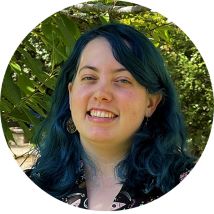 Department:
Earth and Planetary Sciences
Department:
Earth and Planetary SciencesMentor: Corinne Myers, Ph.D.
Interests: Sedimentology/Stratigraphy/Paleoclimate/Paleontology
Bio
Nolan received a degree in Geosciences from Smith College in Northampton, Massachusetts. She did her undergraduate thesis work in paleontology with Dr. Sara Pruss, studying the extinction of lower Cambrian archaeocyathan sponges in the southwestern United States. During a semester abroad, Nolan worked with Dr. Jonathan Davidson at the University of Canterbury in Christchurch, New Zealand, using drone mapping to measure the slip effects observed in landslides before vs. after a tropical storm. After college, she spent two years as a postgraduate associate at Yale University, working with Dr. Noah Planavsky and Dr. Lidya Tarhan on a variety of geochemical and paleontological projects, including collecting and analyzing estuarine sediment cores to study bioturbation intensity in modern anoxic environments and reducing LA-ICP-MS data of Ediacaran arenites to study cementation using Ge-Si ratios.
Nolan is currently working on a master's project with Assistant Professor Corinne Myers at the University of New Mexico, applying the Niche Center Hypothesis to paleoecological abundances of marine bivalves across the Pleistocene through modern.
Samantha “Sami” Stroud
M.S. Student
Entered 2022
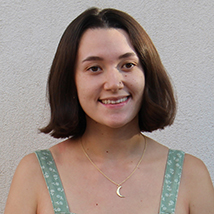 Department:
Geography
Department:
GeographyMentor: Ronda Brulotte, Ph.D.
Interests: Environmental Studies
Bio
Samantha "Sami" Stroud was born in Albuquerque, New Mexico, and has lived there for most of her life. She found her love for plants of the Southwest by exploring the Sandia Mountains with her father and through her mother's family lineage of curanderismo (Mexican folk healing).
Stroud attended college as an Honors student at Arizona State University (ASU), double majoring in Japanese and Chinese Language and Literature. While at ASU, she spent a summer abroad in Hiroshima, Japan, studying the Japanese language and culture at Hiroshima Shudo University. After two years at ASU, Stroud returned to her hometown of Albuquerque to study at the University of New Mexico (UNM). She spent an additional semester abroad studying Chinese at Xibei University in Xi'an, China. She obtained a dual degree in Geography and East Asian Studies (Chinese concentration), with minors in Interdisciplinary Honors and Japanese
As an undergraduate, she participated in an Honors Research Institute, conducting archival research on Hispanic Historic Sites in New Mexico. She has also worked at the Southwest Environmental Finance Center, where she authored a white paper comparing tap and bottled water resources in the state of New Mexico and is currently collaborating on a comprehensive guide to the Clean Water and Drinking Water Act State Revolving Funds.
Stroud is a second-year Masters student in the department of Geography and Environmental Studies at the UNM. Her research focuses on shifting epistemologies and pedagogies of herbal medicine in New Mexico. She also has broad interests in human-plant relationships and more-than-human geographies.
Tabitha McFarland
M.S. Student
Entered 2021
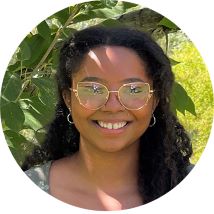 Department:
Biology
Department:
BiologyMentor: Joe Cook, Ph.D.
Interests: Evolutionary Biology
Bio
McFarland is a first-year M.S. student in Distinguished Professor Joe Cook's lab at the University of New Mexico. While pursuing her M.S. she will be transitioning into studying small mammal evolutionary history and phylogeography. Specifically, McFarland will be studying the population genomics and phylogeography of the yellow-rumped leaf-eared mouse (Phyllotis xanthopygus) to better understand hypoxia's adaptations across elevation in the Andes.

